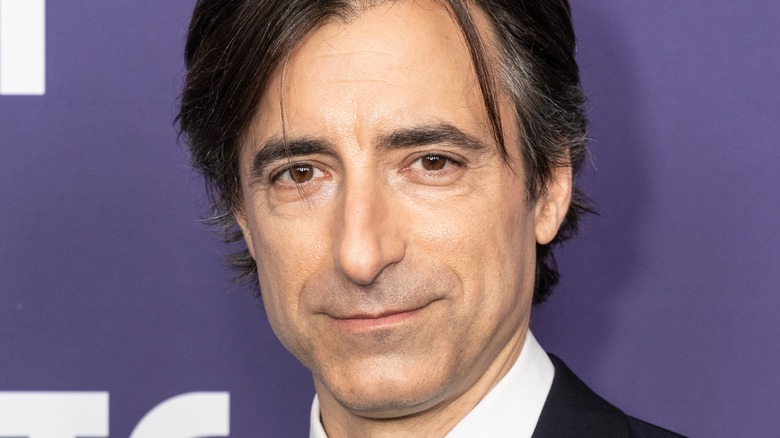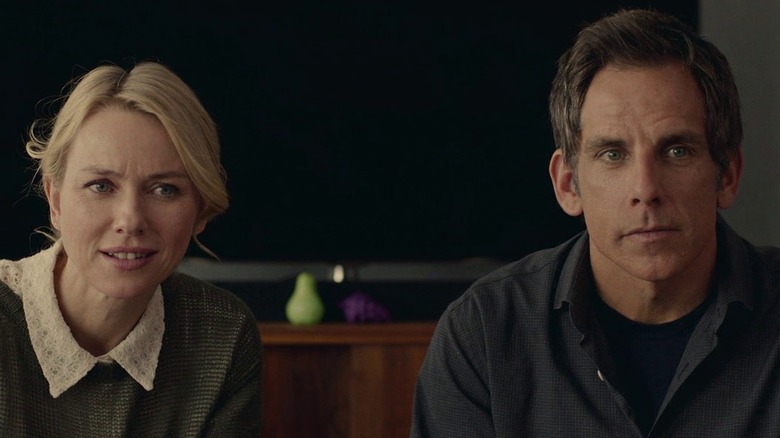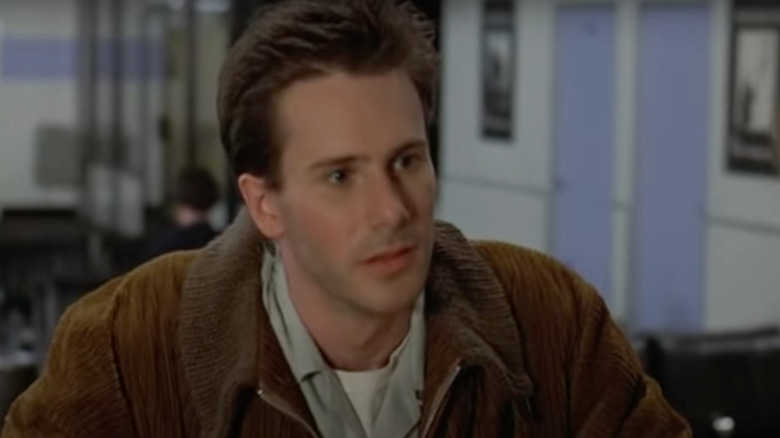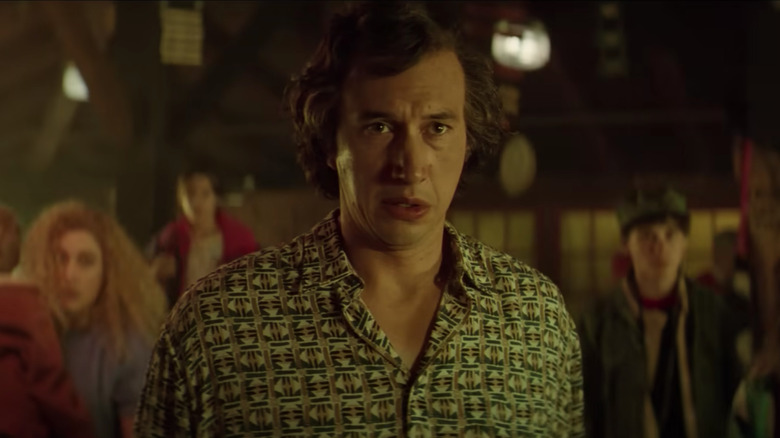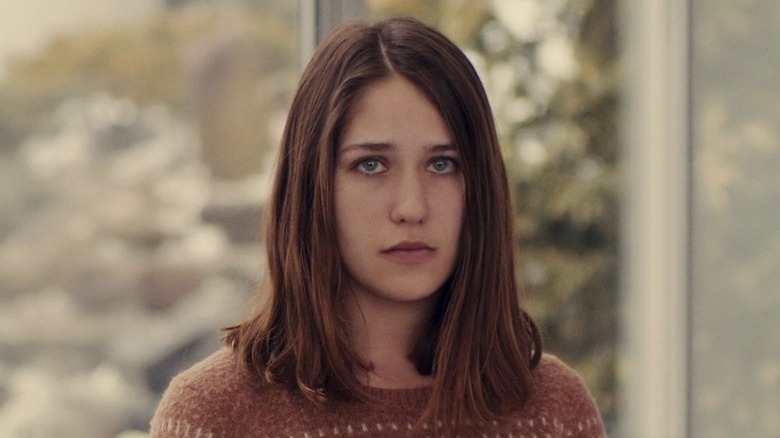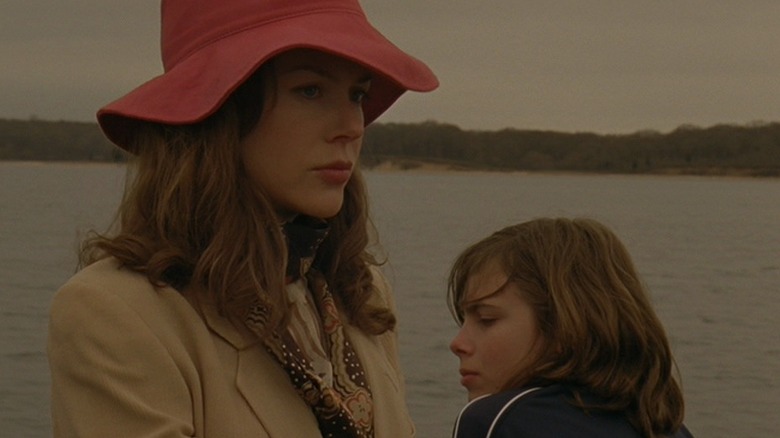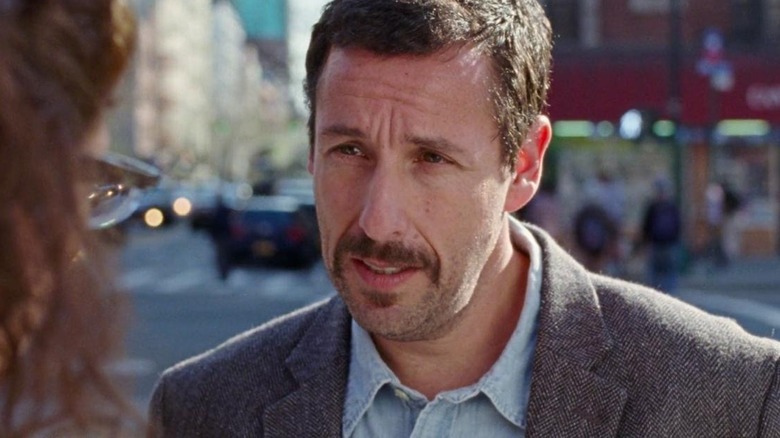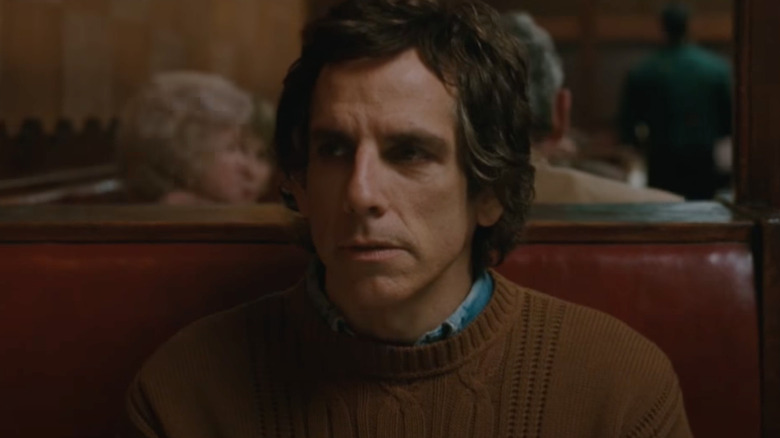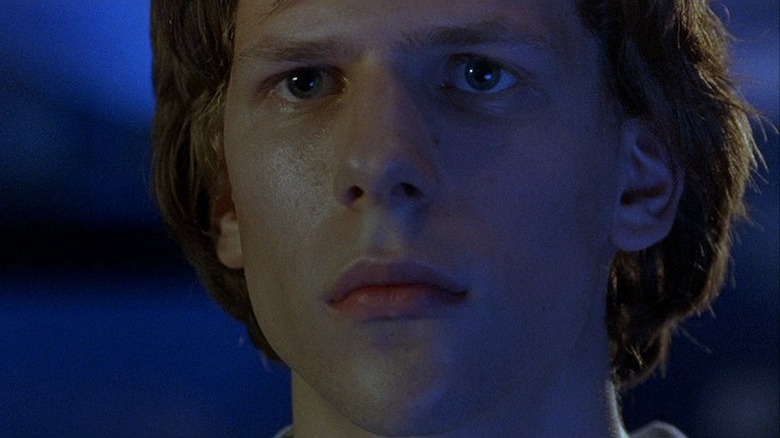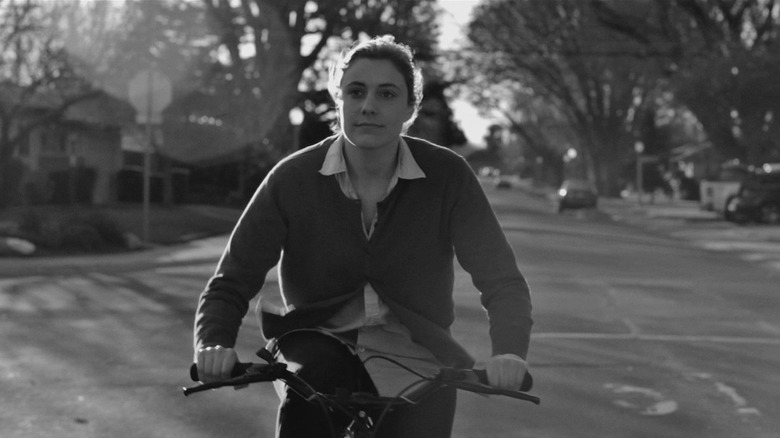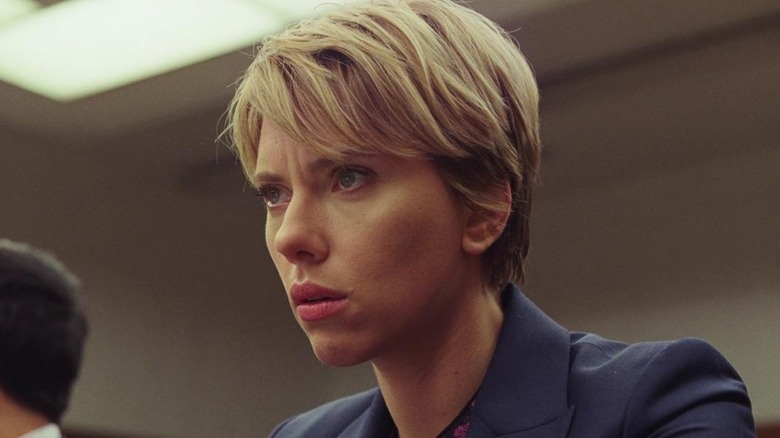Noah Baumbach's 10 Best Movies Ranked
New York City-born writer and director Noah Baumbach first made a splash in the American independent film scene with his 1995 directorial debut "Kicking and Screaming." The ensemble comedy channeled the disaffected ennui of post-collegiate Gen Xers struggling to find their place in the world, showing a new sardonic cinematic voice in Baumbach. It wasn't until a decade later, though, after the less successful "Mr. Jealousy" and the unfinished film "Highball," that Baumbach fully broke through with his 2005 film "The Squid and The Whale."
The semi-autobiographical comedy about Baumbach's childhood in Brooklyn and his parents' messy divorce deftly introduced the themes he went on to interrogate in his ensuing films, from the artistic struggle and panic about aging to fraught marriages and intergenerational conflict. Like most auteurs, Baumbach has a stable of frequent collaborators, including Adam Driver, Ben Stiller, and real-life partner Greta Gerwig. Although Baumbach's work continues to grow in size and scale with each new film, they all retain his distinct sense of humor — one that privileges, above all, blunt honesty. Here are his 10 best movies, ranked.
Warning: There will be spoilers ahead.
10. While We're Young
"While We're Young" follows married New York City couple Josh (Ben Stiller) and Cornelia Srebnick (Naomi Watts), a documentary filmmaker and film producer, respectively, who are at an impasse as they enter middle age. Their marriage has been on the rocks for some time now, as they've struggled professionally to mount and finance their film projects and personally to conceive a child together. When a younger married couple — aspiring filmmaker Jamie (Adam Driver) and Darby Massey (Amanda Seyfried) — approach Josh after he delivers a lecture about documentary filmmaking at a local university, they invite him out and plant the seeds for an unlikely friendship.
As the two couples' bond develops, Jamie and Darby's carefree optimism infects Josh and Cornelia's stagnant lives, reinvigorating them with the joie de vivre they abandoned years prior. "While We're Young" incorporates most of Baumbach's signatures, from its vivid New York City specificity to arrogant, curmudgeon characters forced to do some soul searching. But the humor of this Generation-X-versus-Millennials satire lands inconsistently, as critics noted. Of Baumbach's trilogy working with Ben Stiller, "While We're Young" feels like the least consequential, as it never quite excavates the poignant insight of "Greenberg" or "The Meyerowitz Stories."
9. Kicking and Screaming
In his directorial debut, "Kicking and Screaming," Baumbach paints a dynamic portrait of Gen-X malaise, centered on a group of college friends and their romantic partners — Grover (Josh Hamilton), Max (Chris Eigeman), Skippy (Jason Wiles), Otis (Carlos Jacott), Jane (Olivia d'Abo), Miami (Parker Posey), and Kate (Cara Buono). Right off the bat, Baumbach displays a natural proclivity for sharp, incisive dialogue in his writing, giving Grover and Max biting lines as they navigate the choppy seas of post-collegiate existence. Grover in particular drags his feet as he reluctantly stumbles his way into adulthood, ruminating on his botched relationship with Jane in moving, longing flashbacks.
In retrospect, Baumbach may have inadvertently paved the way for future buddy comedies that feature deadbeat man-child characters like those from Judd Apatow's movies — but with a more nuanced intellectualization. Although it's an essential facet of Baumbach's artistic development as both a writer and director, "Kicking and Screaming" unfortunately pales in comparison to the films he would go on to make in the ensuing decades. While its hyper-1990s specificity is one of its strongest assets, it also prevents the film from feeling timeless. And even at the time, critics were pretty split on the movie.
8. White Noise
For Baumbach's biggest film yet, he adapted the novel "White Noise" by Don DeLillo. Set in the 1980s, "White Noise" focuses on Jack Gladney (Adam Driver), a professor of Hitler Studies at the fictional College-on-the-Hill who lives with his dance instructor wife Babette (Greta Gerwig) and their children Denise (Raffey Cassidy), Heinrich (Sam Nivola), and Steffie (May Nivola). The Gladney family's life is upended when a train transporting chemical waste derails nearby, explodes, and creates a toxic cloud, forcing them to evacuate their home and town.
"White Noise" marks the first time Baumbach adapted material for the screen, and the results are a bit mixed. His ambition alone, however, is commendable — tackling an array of genres, from disaster film to absurdist satire, and heady issues including the fear of death, consumerism, and materialism. Whenever he strikes a balance between his distinct comedic stylings and DeLillo's ironic philosophical eccentricities, the results can be sublime. But the story's sheer density and penchant for taking hairpin tonal turns can sometimes leave "White Noise" feeling impenetrable. If anything, the film is an alluring glimpse into Baumbach's potential working with an inflated budget and a towering canvas, but perhaps this ambition would be better served working with an original screenplay.
7. Mistress America
"Mistress America" marks Noah Baumbach's third collaboration with Greta Gerwig and their second time co-writing the screenplay. Tracy Fishko (Lola Kirke) has just moved to New York City for her freshman year at Barnard College, and she can't seem to find her footing. For the most part, she struggles to connect with her peers. Tracy's crushing loneliness pushes her to reach out to her soon-to-be stepsister and fellow New York City resident Brooke Cardinas (Greta Gerwig).
When they share a wild night on the town, Tracy is swept up in Brooke's bawdy life living in boisterous Times Square. She starts tagging along with her as she galavants around the city, engaging in her various professional side hustles, which grow increasingly dubious and nefarious. Drawing on her experiences with Brooke, Tracy writes a short story that lends her entry into the exclusive world of Barnard's literary magazine staff. "Mistress America" is a thoughtful perspective on moving to New York City for school and features delightfully unpredictable turns and a charming screwball tone, with Gerwig and Kirke's performances gaining particular praise.
6. Margot at the Wedding
A defining element in all of Noah Baumbach's films is thorny characters, and his thorniest could very well be the titular Margot (Nicole Kidman) in one of his most divisive films, "Margot at the Wedding."
After the breakout success of his previous film "The Squid and the Whale" and his co-writing credit on Wes Anderson's "The Life Aquatic," Baumbach ostensibly could have done whatever he wanted for his next feature. Instead of going bigger, he stayed in the small-scale human drama lane, this time centering on the fractious relationship between narcissistic writer Margot and her bohemian sister Pauline (Baumbach's then-wife Jennifer Jason Leigh). Margot and her son Claude (Zane Pais) take the bus from New York City to Long Island to attend Pauline's wedding the following day, in which she is set to marry the affable but unambitious musician Malcolm (Jack Black). Margot wastes no time before sharing her disdainful feelings about Malcolm with Pauline, dredging up family drama and secrets long since buried.
"Margot at the Wedding" is Baumbach at his most acerbic, particularly in Margot and Pauline's venomous verbal sparring scenes. Baumbach never formally diagnoses Margot or suggests the root of her ferocious contempt for seemingly everyone — her family in particular — but it's clear that she's struggling with her mental health. In the hands of another filmmaker, these emotionally merciless scenes could have come off as gratuitous or labored. But Leigh and Kidman's searingly naturalistic performances and Baumbach's brutally honest writing keep "Margot at the Wedding" grounded.
If you or someone you know needs help with mental health, please contact the Crisis Text Line by texting HOME to 741741, call the National Alliance on Mental Illness helpline at 1-800-950-NAMI (6264), or visit the National Institute of Mental Health website.
5. The Meyerowitz Stories
The first in a series of collaborations with Netflix, Noah Baumbach's "The Meyerowitz Stories" is an amalgamation of the writer/director's thematic interests and an affecting portrait of a dysfunctional New York City family of artists. When Danny Meyerowitz (Adam Sandler) separates from his wife, he moves in with his terse father Harold (Dustin Hoffman), a former college professor who attained minor fame in the art world for his sculpture work.
Time has been unkind to Harold, as he's since faded into artistic obscurity. He finds himself in dire financial straits, with no support to be found from his charismatic but aloof wife Maureen (Emma Thompson). Harold's other son, Los Angeles-based financial advisor Matthew (Ben Stiller), flies to New York City to convince his father to downsize his life and settle his mounting financial woes by selling his treasured brownstone home. When Harold suddenly falls ill, his children — including perpetually overlooked Jean (Elizabeth Marvel) — are all reunited and forced to confront past trauma and unresolved conflicts, banding together to support their father in his time of need. "The Meyerowitz Stories" is one of the gentler entries in Baumbach's filmography, boasting a lovably neurotic ensemble cast and a more sincere, vulnerable tone. The film earned high praise from critics and a number of accolades, solidifying its status as one of Baumbach's best.
4. Greenberg
After writing and directing ensemble-based films like "Kicking and Screaming" and "The Squid and the Whale," Noah Baumbach delivered his first character study and California-based film with "Greenberg." Following temporary hospitalization after suffering a nervous breakdown, New Yorker and former musician Roger Greenberg (Ben Stiller) travels across the country to Los Angeles to dog and house sit for his successful younger brother Phillip (Chris Messina) and his wife Carol (Susan Traylor). Roger plans to utilize his six weeks in Los Angeles as a solitary reset — a chance to essentially do nothing besides exist and get back on his feet after his mental health struggles.
But, naturally, life gets in the way when he meets Philip and Carol's personal assistant, Florence Marr (Greta Gerwig). The two strike up a friendship that veers into becoming something more. Roger is also forced to face his past mistakes when he's reunited with his former bandmates, the timid Ivan (Rhys Ifans) and aggressive Eric (Mark Duplass), who both have long-held resentment toward Roger for effectively breaking up their old band. Co-written by Baumbauch's then-wife and co-star Jennifer Jason Leigh, "Greenberg" is a thoughtful, confrontational look at a middle-aged man's reckoning with growing older.
If you or someone you know needs help with mental health, please contact the Crisis Text Line by texting HOME to 741741, call the National Alliance on Mental Illness helpline at 1-800-950-NAMI (6264), or visit the National Institute of Mental Health website.
3. The Squid and the Whale
Noah Baumbach's breakthrough hit "The Squid and the Whale" is both one of the best indie movies of the 21st century and one of the definitive cinematic texts on divorce. Set in 1986 in Park Slope, Brooklyn, the autobiographical dark comedy centers on the dissolution of the Berkman family unit. Things come to a head when arrogant, has-been fiction writer and current creative writing professor Bernard (Jeff Daniels) grows toxically jealous of the success that his writer wife Joan (Laura Linney) experiences with the release of her acclaimed short story in The New Yorker. Bernard and Joan separate, agreeing to raise their two boys — teenaged budding intellect Walt (Jesse Eisenberg) and wayward pre-teen Frank (Owen Kline) — in joint custody.
As the new dynamic weighs on the kids, it has reverberations on the adults as well, leading Joan to date Frank's tennis instructor Ivan (William Baldwin) and Bernard to pursue his student Lili (Anna Paquin). As their parents' separation grows uglier and uglier, Walt and Frank come to blows about whom to support. Bernard-worshipper Walt blames Joan's infidelity for the disintegration of their family, while Frank sides with their mother but acts out in disturbing ways at school.
"The Squid and the Whale" is a deeply hilarious, bracingly raw, and authentic look at the toll divorce takes on a family and how our opinions of our mothers and fathers can change when we start viewing them as people beyond their parental responsibilities. The film earned Baumbach his first Academy Award nomination for best original screenplay and was a surprise hit at the box office given its modest budget, also winning widespread critical acclaim.
2. Frances Ha
After directing her in "Greenberg," Noah Baumbach re-teamed with Greta Gerwig — this time as a co-writer, as well — for the effervescent quarter-life crisis comedy "Frances Ha." Gerwig stars as Frances, an aspiring professional dancer living in Brooklyn who's financially hard-strapped and professionally stuck as an apprentice at a dance company. Early on in the film, she confesses, "I'm so embarrassed. I'm not a real person yet." Despite her struggles, Frances finds solace in her close relationship with her best friend from college and roommate, Sophie Levee (Mickey Sumner), who works in publishing at Random House. When Sophie gets an opportunity to move into her dream apartment in Tribeca, Frances is unable to afford the steep rent price tag.
Unable to keep their apartment herself, Frances has no choice but to move in with her acquaintances-turned-friends Lev Shapiro (Adam Driver) and Benji (Michael Zegen), sleeping on their couch in Chinatown. More bad news arrives for Frances when she learns that her dance company will not be using her for their annual Christmas show. Frances travels home to Sacramento, couch surfs at her friend Rachel's (Grace Gummer), spontaneously ventures to Paris, and takes a humbling summer job working at her alma mater. Throughout all of Frances' various hijinks and setbacks, she maintains an unwavering, romantic sense of optimism rarely seen in Baumbach's work, rendering "Frances Ha" an endlessly quotable, lovable outlier in his filmography.
1. Marriage Story
The best film of Noah Baumbach's accomplished career is undoubtedly his Oscar-winning, critically hailed "Marriage Story." The dramedy opens with an inventive sequence in which theater company owner and director Charlie (a never-better Oscar nominee Adam Driver) and actress Nicole (an equally never-better Oscar nominee Scarlett Johansson) each narrate a montage explaining why they love one another. It's a clever gesture that immediately shows us how much these two care for each other, which makes it all the more emotionally devastating when we learn that they're headed toward divorce.
When Nicole is offered the lead role in a science-fiction TV pilot, she travels to Los Angeles to shoot it with their young son Henry (Azhy Robertson), while Charlie stays in New York to mount his own play on Broadway. When Charlie flies out to visit Nicole and Henry, he's blindsided when Nicole's sister Cassie (Merritt Wever) serves him with divorce papers. Charlie and Nicole are thrust into what they promise to keep a fair and positive divorce, but which inevitably tailspins into nastiness. Charlie's flailing legal team is no match for Nicole's ruthlessly high-power attorney Nora Fanshaw (Oscar winner Laura Dern), who goes for the jugular in her efforts to secure Nicole's full-time custody of Henry.
"Marriage Story" finds Baumbach in his comfort zone, trafficking in the toll of divorce on a family and the arduous cost of leading the life of an artist. But he operates on a different level here, delivering a mature meditation on all the themes he's explored since starting off nearly 25 years prior. He imbues this film with bittersweet heartbreak and wisely keeps the sympathy scales balanced between Charlie and Nicole so that there's no clear hero or villain to be found. Everyone, he suggests, can be collateral damage when it comes to love.
